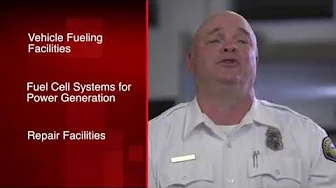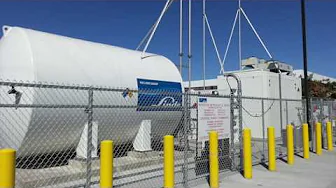- Home
-
Resources
- Center for Hydrogen Safety
- Hydrogen Fuel Cell Codes and Standards
- Learnings & Guidance
- Paper & References
- Web-based Toolkits
- Workforce Development

- Contact
- About H2Tools
- Welcome to the Hydrogen Tools Portal
- helpdesk@h2tools.org
Codes & Standards
Permitting Tools
A National Renewable Energy Laboratory resource
Codes & Standards - Permitting Tools
Permitting Hydrogen Fueling Station
Four-Part Video Series
NREL supported the production of "Permitting Hydrogen Fueling Stations" a four-part video done by the Orange County (California) Fire Authority. This video will give AHJs, Project Developers, and other interested parties a quick orientation in permitting hydrogen fueling stations.The video provides basic background information on hydrogen technologies followed by a description of the permitting process including an overview of key codes and standards. The video is hosted by Carl Baust P.E., a fire protection engineer with the Orange County Fire Authority experienced in permitting hydrogen fueling stations. The video contains interviews with code officials, emergency responders, and technical experts as well as footage of hydrogen stations.
Contact carl.rivkin@nrel.gov for more information.
Code Official
Training Course
Online interactive format. This online training is divided into the following modules:
- Module 1 Hydrogen & Fuel Cell Basics
- Module 2 Hydrogen & Fuel Cell Applications
- Module 3 Hydrogen Fueling Stations
- Module 4 Fuel Cell Facilities
The course includes questions at the end of each module to confirm the student has learned the basic points of the module. Currently available online at The Department of Energy's Introduction to Hydrogen for Code Officials Online Training Course (Update 2016.)
NFPA-2 Plan Review Checklist and
National Permit Guide for Hydrogen Fueling Stations
The Hydrogen Fueling Station Plan Review Checklist (the Checklist) will assist users in demonstrating compliance with NFPA-2 2016 Edition. The Checklist simplifies both the project development and safety review processes.
The Checklist is constructed to demonstrate compliance with key code requirements for outdoor hydrogen fueling stations employing delivered hydrogen, bulk Liquified hydrogen (LH2) and Gaseous Hydrogen (GH2) Storage, and high pressure GH2 Dispensing.
This checklist document contains only code citations and not the actual code text.
Complete update of the 2004 document including updated references to the 2016 edition of NFPA 2 Hydrogen Technologies Code . Now available at Guide to Permitting Hydrogen Motor Fuel Dispensing Facilities.
Short overview of
NFPA 2 Hydrogen Technologies Code
This presentation covers the basic requirements and structure of NFPA 2 Hydrogen Technologies 2016 edition. NFPA 2 is referenced in both the IFC and NFPA 1 making it effectively the national code for hydrogen safety.
Hydrogen Technologies
Safety Guide
This guide provides basic information on hydrogen technologies and safety. The primary objective of this guide is give users who are unfamiliar with hydrogen technologies basic background information on the technologies, safety issues of concern, and safety requirements intended to address these safety issues.
The information in the guide includes:
- History of hydrogen technologies
- Basic properties of hydrogen
- Regulations, codes and standards that apply to hydrogen technologies
Telecommunication Industry Association Guide to
Siting Stationary Fuel Cells
Make Informed Decisions Using the TIA Fuel Cell Reference Guide
As an alternative to competing power solutions, there are more than 1,000 stationary fuel cells for backup power currently deployed across the U.S., and that number is rapidly growing. Fuel cells provide the ICT industry clean and reliable power. Unlike other backup power options, fuel cells have almost no moving parts and require minimal maintenance.
To help entities tap into ways to use fuel cells for backup power, a critical resource titled the "TIA Fuel Cell Reference Guide: Compliance with Regulations, Codes, and Standards for the Deployment of Stationary Fuel Cells" was developed by the TIA Focus Group on Fuel Cell Standards for ICT Infrastructure to address power issues related to cell towers. The group produces documents and technical leadership on fuel cell issues to advance and inform the ICT industry on clean, sustainable, and reliable power.
The Guide is presented in a succinct, clear and accessible format and enables companies to:
- Make informed decisions when deploying stationary fuel cells as backup power units at cell tower sites
- Move more quickly through the permitting and approval process when deploying fuel cell power systems
- Understand the regulations, codes and standards that must be met for safe and compliant installations - typically one of the largest barriers to further deployment of stationary fuel cell technologies
Permitting Resources Including
Modeling Tools
The file contains information on air dispersion models and risk assessment software that may be used to develop permit applications for hydrogen technology projects.
We are professional and reliable provider since we offer customers the most powerful and beautiful themes. Besides, we always catch the latest technology and adapt to follow world’s new trends to deliver the best themes to the market.
Contact info
We are the leaders in the building industries and factories. We're word wide. We never give up on the challenges.
- 2 Queen Street,California, USA
- (+84) 04 123 456
- :Helpdesk@h2tools.org




